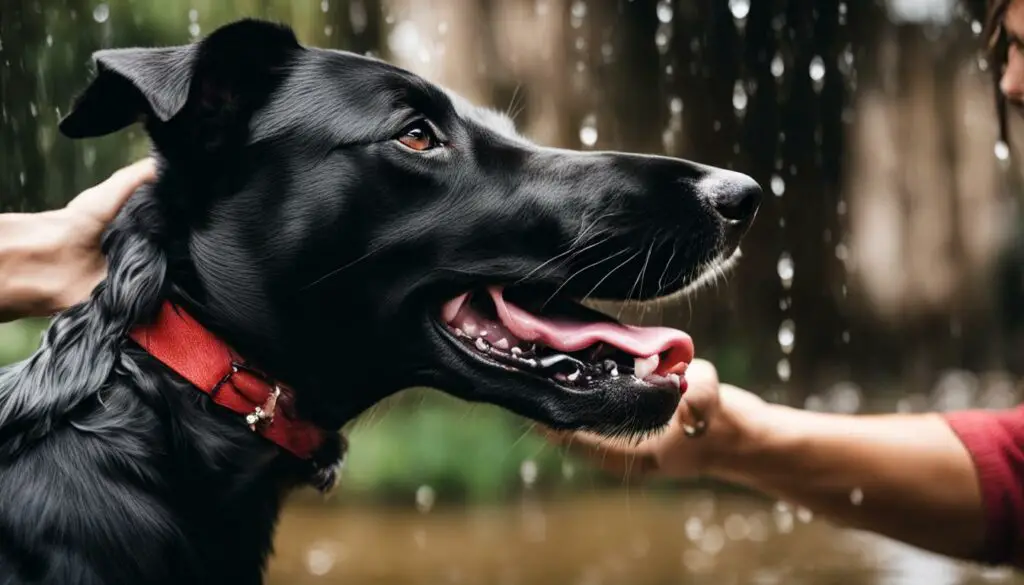Have you ever wondered why your dog has a seemingly insatiable urge to lick your arm? I certainly have. It’s a behavior that has left many pet owners puzzled, myself included. But fear not, because today we are diving deep into the world of dog licking behavior to uncover the reasons behind this fascinating canine quirk.
- Understanding dog behavior can help unravel the mystery of why dogs lick arms excessively.
- Licking is a natural behavior that can serve various purposes, from social bonding to communication.
- Dogs may lick arms excessively due to instinctual origins, communication gestures, or as a way of exploring their environment.
- Excessive licking can also be a sign of underlying medical issues, such as allergies or skin disorders.
- If you have a Boston Terrier, factors like stress, boredom, allergies, or digestive issues may contribute to their excessive licking behavior.
Takeaways>
The Instinctual Origins of Licking
Understanding why dogs lick our arms excessively requires a look into their natural licking behaviors, which stem from their instinctual survival behaviors and social bonding. Similar to their wolf ancestors, puppies engage in licking as a form of social bonding, creating affection and mutual satisfaction. It serves as a way for them to communicate and express their emotions.
When puppies lick each other, it helps establish a sense of connection and belonging within their pack. This behavior is crucial for their emotional development and plays a significant role in their social interactions throughout their lives. Furthermore, licking serves a practical purpose by assisting in cleanliness, particularly in hard-to-reach areas that the mother may not be able to groom effectively.
Table: The Instinctual Origins of Licking
| Instinctual Behaviors | Description |
|---|---|
| Social Bonding | Licking fosters affection and mutual satisfaction among puppies, creating emotional bonds. |
| Communication | Licking is a means of expressing emotions and communicating with other dogs. |
| Grooming | Licking aids in cleanliness, especially in areas that are difficult to reach. |
Communication through Licking
In the world of canines, licking plays a significant role in communication between dogs. It is not just a simple act of cleaning or grooming; it holds deeper meaning in their social interactions. Dogs use licking as a friendly gesture to show affection towards other dogs or humans. It is their way of expressing love and building stronger bonds.
Licking can also be a way for dogs to establish dominance or submit to a more dominant dog. In a pack setting, a dog may lick the face or neck of a more dominant pack member as a sign of respect. This gentle act of licking is a way for dogs to convey their place in the social hierarchy.
“Licking is a natural behavior for dogs, and it serves a variety of purposes in their social interactions.”
Puppies, in particular, use licking as a substitute for mouthing behavior. When puppies are young, they are prone to nibbling and nipping as part of their exploration and play. However, as they grow older, they start to replace this behavior with licking. Licking becomes a way for puppies to interact with their environment without causing harm.
| Communication through Licking: | Description: |
|---|---|
| Friendly Gesture | Dogs use licking as a way to show affection and build stronger bonds. |
| Dominance and Submission | Licking can be a way for dogs to establish dominance or submit to more dominant dogs. |
| Puppy Mouthing Behavior | Puppies use licking as a substitute for mouthing behavior during their exploration and play. |
Licking as a Greeting and Exploration
When your dog licks your arm, it’s not just a random behavior but can serve as a greeting gesture and a way of exploring the world around them. Dogs often use licking as a friendly gesture to show affection and to communicate their friendly intentions. Along with tail wagging and smiling, licking is their way of expressing joy and happiness. It’s their unique way of saying, “Hello, I’m happy to see you!”
Moreover, licking also serves as a means for dogs to explore their environment. By licking objects and surfaces, they can gather information about their surroundings. Dogs have a remarkably powerful sense of smell, and when they lick your arm, they may be attempting to obtain valuable salt that your skin naturally produces. This behavior helps them to familiarize themselves with different scents and tastes, allowing them to learn about the world in which they live.
“Licking is a dog’s way of saying ‘Hello, I’m happy to see you!'”
Table: The Fascinating World of Dogs’ Licking Behavior
| Behavior | Description |
|---|---|
| Greeting Gesture | Dogs use licking as a friendly gesture to show affection and to communicate their friendly intentions. |
| Exploration | Licking objects and surfaces allows dogs to gather information about their surroundings and learn about different scents and tastes. |
| Obtaining Valuable Salt | Dogs may lick human appendages to obtain the valuable salt naturally produced by our skin. |
So, the next time your furry friend showers you with slobbery kisses, remember that it’s their way of greeting you and exploring the fascinating world around them. Embrace their affectionate gestures and enjoy the unique bond you share with your canine companion!
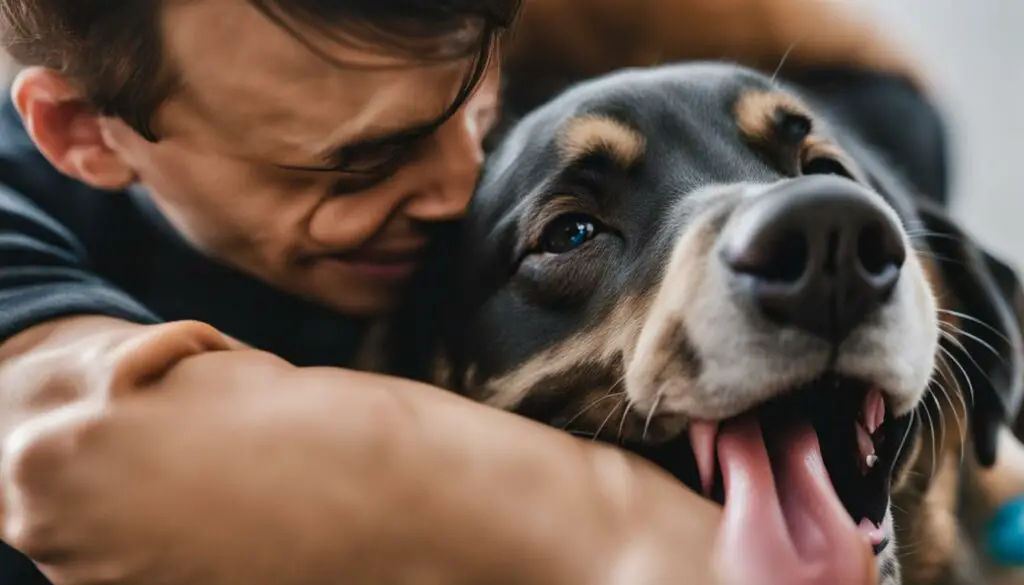
Stay tuned for the next section, where we will explore the issue of excessive licking and possible medical causes in dogs.
Excessive Licking and Possible Medical Causes
Excessive licking in dogs can be a cause for concern and may indicate an underlying medical condition. It’s important to understand that dogs use licking as a natural behavior, but when it becomes excessive, it could be a sign that something is wrong.
One possible cause of excessive licking is allergies. Dogs can be allergic to certain substances in their environment, such as pollen, dust mites, or certain foods. When they come into contact with these allergens, it can lead to itchiness and discomfort, prompting them to lick excessively to alleviate the irritation.
Another potential cause is skin diseases. Dogs can suffer from various skin conditions, including dermatitis, eczema, or fungal infections. These conditions can cause itching and inflammation, resulting in increased licking as a way to soothe the affected areas.
| Underlying Medical Conditions | Symptoms |
|---|---|
| Allergies | Scratching, redness, rashes, sneezing, runny nose, itching |
| Skin Diseases | Itching, redness, inflammation, hair loss, sores |
| Digestive Issues | Vomiting, diarrhea, changes in appetite, weight loss |
If your dog’s licking seems excessive or out of the ordinary, it’s best to consult with your veterinarian to rule out any potential medical causes. They can perform a thorough examination, conduct tests if needed, and provide a proper diagnosis. Treating the underlying condition will help alleviate the excessive licking and improve your dog’s overall well-being.
In addition to allergies and skin diseases, digestive issues can also contribute to excessive licking. Dogs with gastrointestinal problems, such as an upset stomach or food intolerance, may lick excessively as a way to alleviate discomfort. Other symptoms that may accompany digestive issues include vomiting, diarrhea, changes in appetite, and weight loss.
It’s important to note that while excessive licking can be a sign of an underlying medical condition, it’s not always the case. Dogs may also lick excessively due to behavioral issues, boredom, stress, or anxiety. Therefore, it’s crucial to observe your dog’s behavior holistically and consider all possible factors before drawing any conclusions.
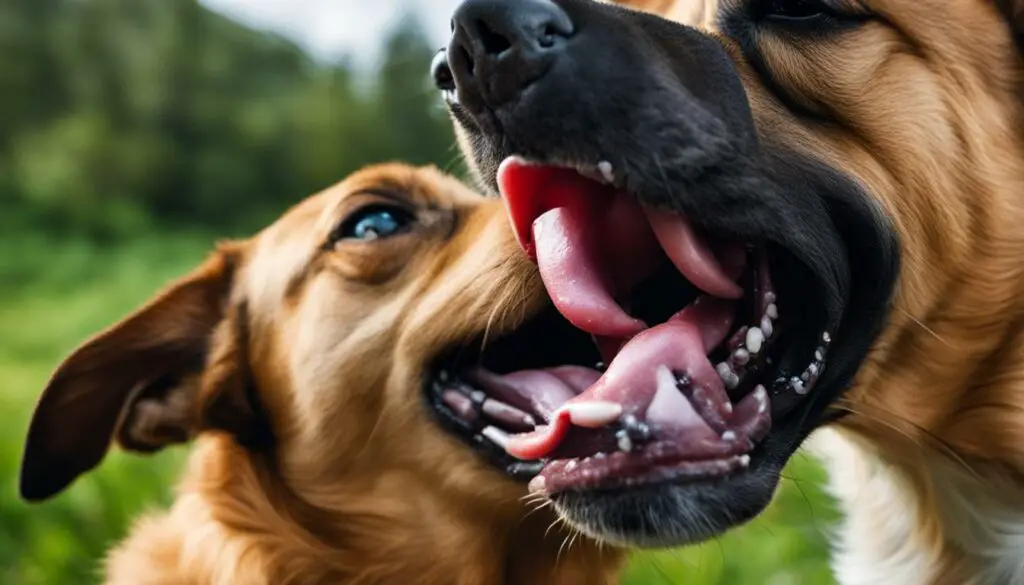
Potential Medical Causes of Excessive Licking in Dogs
Excessive licking in dogs can be attributed to various underlying medical conditions. The table below highlights some of the common symptoms associated with these conditions:
| Underlying Medical Conditions | Symptoms |
|---|---|
| Allergies | Scratching, redness, rashes, sneezing, runny nose, itching |
| Skin Diseases | Itching, redness, inflammation, hair loss, sores |
| Digestive Issues | Vomiting, diarrhea, changes in appetite, weight loss |
If your dog’s licking seems excessive or out of the ordinary, it’s best to consult with your veterinarian to rule out any potential medical causes. They can perform a thorough examination, conduct tests if needed, and provide a proper diagnosis. Treating the underlying condition will help alleviate the excessive licking and improve your dog’s overall well-being.
Remember, excessive licking can be a symptom of an underlying issue, so it’s essential to monitor your dog’s behavior and seek professional advice when necessary. By addressing the root cause of the excessive licking, you can help your furry friend lead a healthier and happier life.
Allergies and Skin Disorders
In dogs, allergies and skin disorders can manifest in various ways, including excessive licking. It is essential to identify the underlying causes to provide appropriate treatment and relief for your furry friend.

Common Allergens
Allergens such as dust mites, pollen, certain foods, and insect bites can trigger hyperallergic reactions in dogs. One common example is grass allergies, which can cause intense itching and discomfort, leading to excessive licking.
Dark Hair Patches
Excessive licking in specific areas can result in dark hair patches on your dog’s skin. This happens due to the irritation and inflammation caused by licking, which can lead to changes in hair pigmentation.
| Allergens | Symptoms |
|---|---|
| Dust mites | Itching, redness, and inflammation |
| Pollen | Runny nose, sneezing, and skin irritation |
| Certain foods | Vomiting, diarrhea, and itchy skin |
| Insect bites | Swelling, hives, and intense itching |
Allergies and skin disorders can be uncomfortable and distressing for dogs. It is crucial to consult with a veterinarian to identify the specific allergens and develop a customized treatment plan to help your dog find relief.
Understanding the role of allergens and skin disorders in excessive licking can lead to effective management and improve your dog’s quality of life. By addressing these underlying conditions, you can support your furry companion’s overall well-being and ensure a happy and comfortable life for them.
Excessive Self Licking and Acral Lick Dermatitis
Excessive self-licking in dogs can lead to a condition known as acral lick dermatitis, a frustrating and often challenging issue for both pets and their owners. It is characterized by persistent licking of a particular area, causing skin irritation and resulting in the formation of a firm, raised lesion.
Acral lick dermatitis commonly affects areas such as the lower legs, paws, and wrists. The constant licking and chewing can disrupt the healing process, leading to a cycle of inflammation and compulsive licking. This condition is often triggered by itching, discomfort, or the presence of a foreign body, even after the initial cause has been removed.
Treating acral lick dermatitis usually involves a combination of medical management and behavior modification techniques. Cortisone treatment may be prescribed to reduce inflammation and alleviate itching. Additionally, identifying and addressing any underlying causes, such as allergies or anxiety, is essential to prevent the recurrence of compulsive licking.
Causes of Acral Lick Dermatitis:
- Foreign body itch
- Underlying allergies
- Anxiety or stress
- Pain or discomfort
Treatment options for Acral Lick Dermatitis:
- Cortisone treatment to reduce inflammation and itching
- Identifying and addressing any underlying medical conditions
- Behavior modification techniques to discourage excessive licking
- Protective measures such as bandages or Elizabethan collars to prevent further damage
It is important to consult with a veterinarian to determine the underlying cause of the excessive self-licking and develop an appropriate treatment plan. With proper management and patience, it is possible to help your dog overcome acral lick dermatitis and provide them with relief from constant itching and discomfort.
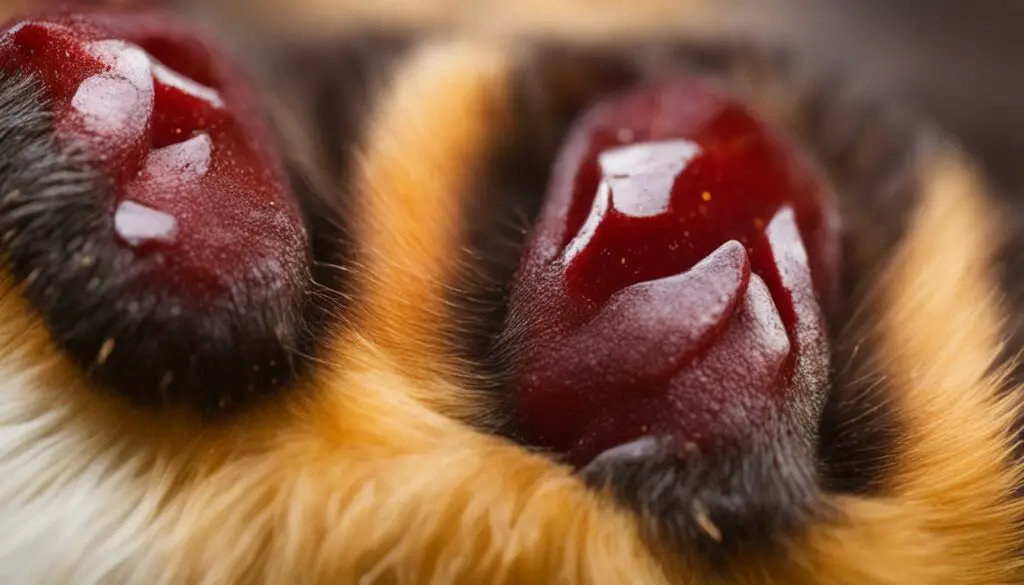
When Excessive Licking becomes a Concern
If your dog’s licking behavior becomes repetitive and excessive, it may be cause for concern. While occasional licking is normal, excessive licking can have serious consequences and should not be ignored. Here are some factors to consider when assessing your dog’s excessive licking:
- Repetitive licking: When a dog engages in repetitive licking, it can lead to various issues. One concern is the potential for an intestinal blockage if the dog ingests fibers from excessive licking. This can be dangerous and may require immediate veterinary attention.
- Anxiety and stress: Excessive licking can be a manifestation of anxiety or stress in dogs. Changes in schedule, separation anxiety, or environmental factors can all contribute to this behavior. Identifying and addressing the underlying cause of anxiety is crucial for the well-being of your furry friend.
- Medications: Certain medications can cause dogs to lick excessively. If your dog recently started a new medication and you notice an increase in licking behavior, it’s important to consult with your veterinarian. They may be able to suggest an alternative medication or adjust the dosage to alleviate this side effect.
Monitoring your dog’s behavior and seeking veterinary advice is key when excessive licking becomes a concern. It’s important to address any underlying medical conditions, such as allergies, skin diseases, or digestive issues, that may be contributing to the excessive licking. A thorough examination by a veterinarian can help determine the cause and appropriate treatment plan for your dog’s specific needs.
| Licking Behavior | Possible Concerns |
|---|---|
| Repetitive licking | Intestinal blockage, ingestion of fibers |
| Anxiety and stress | Changes in schedule, separation anxiety |
| Medications | Side effects, adjustment of dosage |
Remember, as a responsible pet owner, it’s important to always be attentive to your dog’s behavior and seek professional advice when needed. By addressing excessive licking promptly, you can ensure the well-being and happiness of your beloved furry companion.
Why Do Boston Terriers Lick So Much?
Boston Terriers are known for their adorable and affectionate nature. But why do they lick so much? As a Boston Terrier owner, I’ve often wondered about this quirky behavior and what it might mean.
One possible reason for excessive licking in Boston Terriers is stress or nervousness. These little pups may use licking as a self-soothing technique to cope with uncomfortable or stressful situations. Identifying triggers for their anxiety and addressing any underlying issues is crucial to helping them feel more at ease.
Boredom or restlessness could also be contributing factors. Boston Terriers are intelligent and energetic dogs who thrive on mental and physical stimulation. When they don’t receive enough playtime and exercise, they may resort to excessive licking as a way to release their pent-up energy. Providing them with plenty of opportunities to stay active and engaged can help curb this behavior.
Allergies and skin disorders are another potential cause of excessive licking in Boston Terriers. Itchy or painful conditions may lead them to lick in an attempt to soothe or calm irritated areas. If you notice your Boston Terrier frequently licking certain spots on their body, it’s essential to consult with a veterinarian for a proper diagnosis and a customized treatment plan.
Lastly, digestive issues could be a culprit. If your Boston Terrier is experiencing nausea, an upset stomach, vomiting, diarrhea, or changes in appetite, excessive licking may be a symptom. In such cases, it’s important to seek a veterinary evaluation to address any underlying health concerns.
Understanding the reasons why Boston Terriers lick excessively is key to providing them with the care they need. Whether it’s stress, boredom, allergies, or digestive issues, addressing these factors can help curb this behavior and ensure your furry friend’s overall well-being.

Key Takeaways:
- Boston Terriers may lick excessively due to stress, nervousness, boredom, allergies, or digestive issues.
- Identifying triggers for stress or anxiety and addressing them is essential to helping Boston Terriers feel more comfortable.
- Providing mental and physical stimulation can help alleviate boredom and restlessness, which may lead to excessive licking.
- Allergies and skin disorders may cause discomfort, leading Boston Terriers to lick as a way of soothing irritated areas.
- If your Boston Terrier exhibits symptoms like vomiting, diarrhea, or changes in appetite, seek veterinary evaluation for possible underlying digestive issues.
Appreciation and Affection
Boston Terriers are known for their friendly character, and their affectionate behaviors are a testament to their love and loyalty towards their owners. One way they express their appreciation and affection is through licking. When a Boston Terrier licks their owner’s arm, it is a gesture of love and a way for them to show their bond.
This affectionate behavior is deeply ingrained in their nature and stems from their desire to connect with their human companions. Boston Terriers thrive on companionship and enjoy being close to their loved ones. Licking their owner’s arm is their way of expressing their love and forming a strong emotional connection.
It’s important to understand that licking is a natural behavior for dogs and is not necessarily a cause for concern. However, if the licking becomes excessive or bothersome, it may be worth investigating further to rule out any underlying medical or behavioral issues. Consulting with a veterinarian can help determine the cause and provide guidance on managing the behavior if needed.

Table: Reasons why Boston Terriers lick their owners’ arms
| Reason | Description |
|---|---|
| Appreciation | Boston Terriers lick their owner’s arm as a way to show their love and gratitude. |
| Affection | Licking is a form of affectionate behavior that Boston Terriers use to express their love. |
| Bonding | Licking helps Boston Terriers strengthen their bond with their owners and create a sense of closeness. |
| Emotional connection | By licking their owner’s arm, Boston Terriers seek to establish a strong emotional connection. |
In conclusion, Boston Terriers’ friendly character, affectionate behaviors, and their expressiveness through licking demonstrate the love and affection they have towards their owners. Understanding this aspect of their nature can help foster a deeper bond and strengthen the human-animal relationship.
Stress or Nervousness
In some cases, excessive licking in Boston Terriers may be a result of stress or nervousness. Dogs, like humans, can use self-soothing techniques to cope with uncomfortable or stressful conditions. Licking can serve as a form of relaxation and provide a sense of comfort for dogs in these situations.
To address stress or nervousness-related licking, it is crucial to identify the triggers that cause these emotional states in your Boston Terrier. Triggers can vary from loud noises and unfamiliar environments to separation anxiety and social interactions. By understanding what makes your dog uncomfortable, you can work on creating a more calming environment and implementing techniques to alleviate their anxiety.
One effective approach is to provide your Boston Terrier with a safe space, such as a quiet room with familiar objects and a comfortable bed. This can serve as their retreat during times of stress. Additionally, you may consider introducing activities that promote relaxation, such as puzzle toys or gentle massage.
Identifying Stress Triggers
It is essential to observe your Boston Terrier closely to identify specific triggers that contribute to their stress or nervousness. Some common triggers can include:
- Loud noises, such as thunderstorms or fireworks
- Unfamiliar people or animals
- Changes in routine or environment
- Separation from their owner
Once you have identified these triggers, you can take steps to minimize their exposure to them or gradually acclimate them to these situations through desensitization and counterconditioning techniques. It is always advised to seek guidance from a professional dog trainer or behaviorist to develop a personalized training plan tailored to your Boston Terrier’s needs.

Conclusion
Excessive licking in Boston Terriers can be a sign of stress or nervousness. By recognizing and addressing the triggers that cause these emotional states, you can help your dog find relief and create a more harmonious environment for both of you. Remember, patience and consistency are key when working with your Boston Terrier to overcome stress-related licking behaviors.
Mental and Physical Stimulation: Preventing Excessive Licking in Boston Terriers
Boston Terriers, known for their intelligent and energetic nature, require both mental and physical stimulation to prevent excessive licking behaviors. Engaging your Boston Terrier in regular playtime and exercise sessions can help curb boredom and restlessness, which often contribute to excessive licking.
Providing mental stimulation is equally important. Interactive toys, puzzle games, and training activities can keep their minds occupied and prevent them from resorting to excessive licking as a means of entertainment. Consider using treat-dispensing toys or hiding treats around the house to engage their problem-solving skills and keep them mentally stimulated.
In addition to regular exercise and mental stimulation, maintaining a structured routine can help alleviate boredom and restlessness in Boston Terriers. Consistency in mealtimes, play sessions, and potty breaks can provide a sense of security and stability, reducing their need to engage in excessive licking behaviors.
It’s also important to remember that Boston Terriers are social animals that thrive on companionship. Spending quality time with your furry friend, offering plenty of affection and attention, can help prevent them from resorting to excessive licking as a way to seek comfort or alleviate loneliness. By providing the right balance of mental and physical stimulation, you can help your Boston Terrier lead a happy and fulfilled life while reducing the likelihood of excessive licking.
| Mental Stimulation | Physical Stimulation |
|---|---|
|
|
“A Boston Terrier’s mental and physical well-being is closely linked to their behavior. By providing adequate mental and physical stimulation, we can prevent excessive licking and promote a healthy and happy life for our furry friends.” – Dr. Emily Thompson, Veterinary Behaviorist
Remember, every Boston Terrier is unique, so it may take some trial and error to discover the activities that best stimulate your dog both mentally and physically. Consulting with a veterinarian or professional dog trainer can provide valuable guidance and tips tailored to your Boston Terrier’s specific needs. Together, we can ensure our beloved companions lead fulfilling lives free from excessive licking behaviors.

Allergies and Skin Disorders
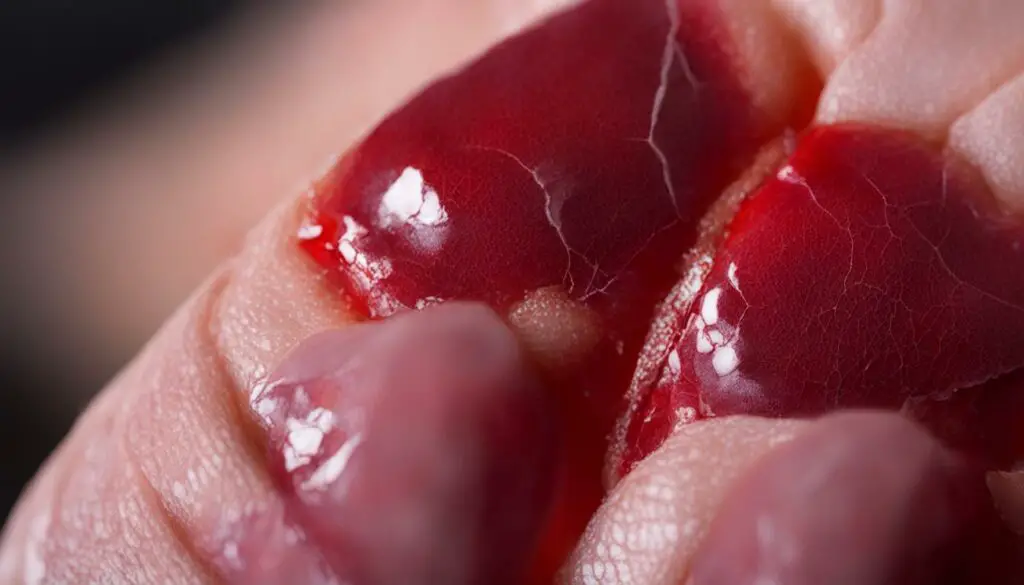
Does your Boston Terrier suffer from itchy or painful skin conditions? Excessive licking may be their way of trying to soothe irritated areas. It’s important to understand that allergies and skin disorders can cause discomfort in our furry friends, leading to excessive licking as a form of self-relief.
Identifying the underlying cause of your Boston Terrier’s skin issues is crucial in providing them with the necessary care and treatment. Consultation with a veterinarian is essential for a proper diagnosis and the development of a customized treatment plan.
Some of the most common skin conditions that can cause itching and discomfort in Boston Terriers include allergies to environmental factors like dust, pollen, or certain foods. Additionally, skin disorders such as dermatitis, hot spots, or fungal infections can also contribute to their discomfort.
| Common Allergens | Signs and Symptoms | Treatment Options |
|---|---|---|
| Pollen | Itchy skin, redness, sneezing | Antihistamines, hypoallergenic diet |
| Dust Mites | Skin irritation, wheezing, coughing | Regular cleaning, air purifiers |
| Food Allergies | Digestive issues, itchy skin, ear infections | Elimination diet, hypoallergenic food |
| Fungal Infections | Red, scaly patches, hair loss | Antifungal medication, topical treatments |
| Dermatitis | Inflamed, itchy skin, sores | Medicated shampoos, corticosteroids |
“It’s important to address allergies and skin disorders promptly to prevent further discomfort and potential complications. By determining the specific triggers and developing a treatment plan tailored to your Boston Terrier’s needs, you can help alleviate their symptoms and improve their overall well-being.”
Preventing Irritation and Promoting Comfort
In addition to seeking veterinary guidance, there are steps you can take at home to help prevent skin irritation and promote your Boston Terrier’s comfort:
- Regular grooming and bathing with pet-friendly products
- Keeping their living environment clean and free from allergens
- Using hypoallergenic bedding and avoiding harsh chemicals
- Providing a balanced diet with high-quality ingredients
- Ensuring proper flea and tick prevention
Remember, a healthy and happy Boston Terrier is a result of your dedicated care and attention to their specific needs. By addressing allergies and skin disorders promptly and providing a nurturing environment for your furry friend, you can help them live their best life free from discomfort.
Digestive Issues
Excessive licking in dogs may occasionally be a symptom of digestive issues such as nausea, an upset stomach, vomiting, diarrhea, or a change in appetite. It is essential to monitor your dog’s behavior and seek a veterinary evaluation if these symptoms accompany the excessive licking.
Table: Digestive Issues Symptoms
| Symptoms | Possible Causes |
|---|---|
| Nausea | Intestinal blockage, ingestion of toxins, gastrointestinal infections |
| Upset stomach | Dietary indiscretion, food allergies, gastritis |
| Vomiting | Gastrointestinal obstructions, infection, pancreatitis |
| Diarrhea | Dietary changes, parasites, intestinal inflammation |
| Change in appetite | Gastrointestinal disorders, dental problems, liver disease |
Understanding the specific symptoms your dog is experiencing can help your veterinarian in diagnosing the underlying cause of the excessive licking. Treatment plans will vary depending on the identified issue, and it’s crucial to follow your veterinarian’s guidance to address the root cause and provide relief to your dog.
Remember, excessive licking can be a sign of underlying medical problems, and early intervention can prevent further complications. So if you notice any persistent or concerning symptoms, don’t hesitate to consult your veterinarian for a thorough evaluation and appropriate treatment.

Article Title: Dogs and Cats: Can They Get Along?
Growing up, I always wondered if dogs and cats could truly be friends. After all, they seem like such different creatures with their distinct behaviors and personalities. But as I delved deeper into the subject, I discovered that dogs and cats can indeed form relationships, and their interaction can be a beautiful thing to witness.
The key to a successful dog and cat relationship lies in the introduction and gradual acclimation. It’s important to understand that each animal is unique, and their compatibility depends on their individual temperaments and experiences. With patience, understanding, and a little bit of effort, you can help your furry friends become lifelong companions.
When introducing dogs and cats, it’s crucial to take it slow. Start by keeping them in separate spaces and gradually allow them to explore each other’s scents and presence from a safe distance. This helps to alleviate any initial stress or fear they may experience.
During the introduction phase, make sure to provide each animal with their own retreat areas. Cats often appreciate vertical spaces where they can observe and retreat when needed, while dogs need their own cozy spot with toys and blankets. This ensures that they both have a sanctuary where they can feel safe and secure.
Supervised interactions are essential during the early stages. Allow them to sniff each other through a baby gate or a slightly opened door. Gradually increase their exposure to one another, always keeping a close eye on their body language and behavior. Remember, a positive experience during these initial encounters is key to building trust and confidence between them.
While some dogs and cats may become best friends, others may simply tolerate each other’s presence. And that’s okay! It’s important to respect their boundaries and not force a relationship if they appear uncomfortable or disinterested. Sometimes, a peaceful coexistence is the best outcome.
Key Takeaways:
- Introducing dogs and cats should be done gradually and with patience.
- Providing separate spaces and retreat areas for each pet is essential.
- Supervised interactions and positive experiences help build trust.
- Not all dogs and cats will become best friends, and that’s okay.
- Respecting their boundaries and allowing for peaceful coexistence is important.
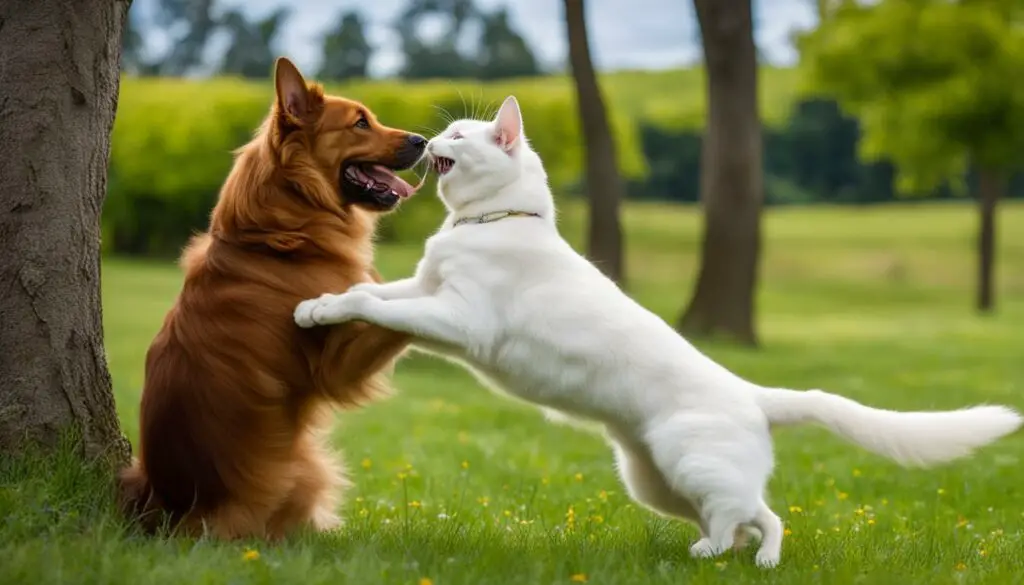
As pet owners, it’s our responsibility to create an environment where our furry friends can coexist harmoniously. The bond between dogs and cats is a testament to the beauty of the human-animal relationship. So, let’s embrace their differences and celebrate the unique connections that dogs and cats can form.
Conclusion
In conclusion, understanding why dogs lick arms excessively involves recognizing their instincts and natural behaviors. Dogs have a range of licking behaviors that serve various purposes, including social bonding, communication, and exploration. Excessive licking can be a sign of underlying medical conditions, such as allergies, skin disorders, or digestive issues.
Similarly, dogs and cats can coexist peacefully when introduced properly and given time to adjust. Building a positive and harmonious relationship between dogs and cats requires patience and understanding. Creating separate spaces for each pet and gradually introducing them can help foster a successful bond.
The bond between pets and their owners plays a significant role in their emotional development and overall well-being. Whether it’s dogs licking arms or fostering cat and dog relationships, raising pets together strengthens the human-animal bond. By providing appropriate care, addressing any medical concerns, and promoting a positive environment, we can create a loving and balanced relationship with our furry companions.
FAQ
Why does my dog lick my arm so much?
Dogs have natural licking behaviors that can range from a form of social bonding to communication and grooming. Understanding these instincts can help determine why a dog may lick your arm excessively.
What are the instinctual origins of licking in dogs?
Licking behaviors in dogs can be traced back to their wolf ancestors. Puppies often lick each other as a form of social bonding, creating affection and mutual satisfaction. It also helps with cleaning hard-to-reach areas that the mother may not reach.
How does licking serve as a form of communication between dogs?
Licking plays a role in communication between dogs. It can be a friendly gesture to show affection or a sign of respect to a more dominant dog. Licking may also be a substitute for puppy mouthing behavior, where dogs lick instead of mouthing or nipping.
Why do dogs lick to greet and show friendliness?
Dogs often lick to greet and show friendliness, along with tail wagging and smiling. Licking can also be a way for them to explore their environment, as it helps them gather information about their surroundings. Licking human appendages may also be an attempt to obtain valuable salt.
What can cause excessive licking in dogs?
Excessive licking in dogs can indicate an underlying medical condition. It may be a response to an irritating odor, substance, or allergen on their coat or skin. Allergies, skin disorders, and digestive issues can also lead to excessive licking.
What are possible medical causes of excessive licking in dogs?
Dogs can develop allergies to certain substances in their environment, such as grasses. This can lead to excessive licking of specific “hot spots” on their body. Allergies and skin disorders may cause dark hair patches where a dog has habitually licked. Thorns or burrs can also cause discomfort and excessive licking.
What is acral lick dermatitis and how is it related to excessive licking?
Excessive self-licking can lead to a condition known as acral lick dermatitis, which may require cortisone treatment. Itching caused by a foreign body or allergy can become overpowering, even after the cause is removed. Dogs may continue to lick an area out of habit or psychological conditioning.
When should I be concerned about my dog’s excessive licking?
Repetitive licking, beyond annoyance, can have serious consequences. It can lead to an intestinal blockage if the dog ingests fibers. Excessive licking can be related to anxiety, changes in schedule, or certain medications. Monitoring the behavior and seeking veterinary advice is crucial.
Why do Boston Terriers lick so much?
Boston Terriers, like other dogs, may lick for various reasons. Stress, boredom, allergies, skin disorders, and digestive issues can contribute to excessive licking in these breeds.
Is excessive licking in Boston Terriers a sign of appreciation and affection?
Boston Terriers may lick their owners as a way to show appreciation and affection. Their friendly character and need for care contribute to their loving gestures.
Can stress or nervousness cause excessive licking in Boston Terriers?
Excessive licking in Boston Terriers may indicate stress or nervousness. They may use licking as a self-soothing technique to cope with uncomfortable or stressful situations. Identifying triggers and addressing underlying anxiety is important.
How can I prevent excessive licking in Boston Terriers due to boredom or restlessness?
Boston Terriers, being intelligent and energetic, require both mental and physical stimulation. Excessive licking may result from boredom or restlessness. Providing appropriate playtime, exercise, and mental stimulation can help curb this behavior.
What should I do if my Boston Terrier has allergies or skin disorders that cause excessive licking?
Allergies and skin disorders can cause itching or pain in Boston Terriers. Excessive licking may be a way to soothe or calm irritated areas. Consulting a veterinarian for proper diagnosis and a tailored treatment plan is important.
Can digestive issues contribute to excessive licking in Boston Terriers?
Excessive licking may occasionally be a symptom of digestive issues, such as nausea or an upset stomach. If additional symptoms like vomiting, diarrhea, or changes in appetite accompany the licking, a veterinary evaluation is necessary.
Can dogs and cats get along?
Dogs and cats can form relationships, but the success depends on the individual animals and their personalities. Introducing them slowly and providing separate spaces can help them adjust and potentially form lasting bonds.
Why is it important to understand dogs’ licking behaviors?
Understanding why dogs lick arms excessively involves recognizing their instincts and natural behaviors. Providing appropriate care and addressing underlying medical concerns can help reduce excessive licking. Similarly, dogs and cats can coexist peacefully when introduced properly and given time to adjust. The bond between pets and their owners plays a significant role in their emotional development and overall well-being.

